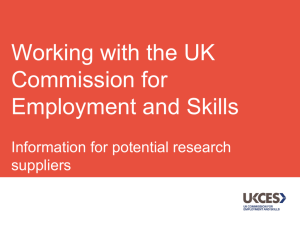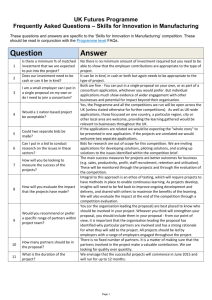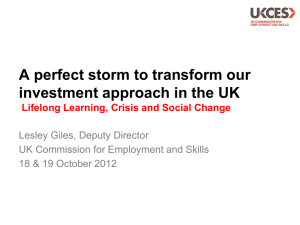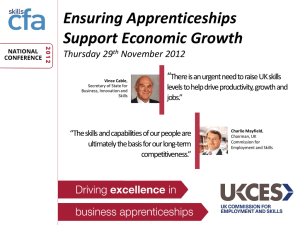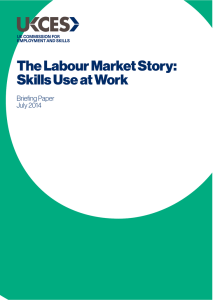Futures Programme: general FAQ
advertisement
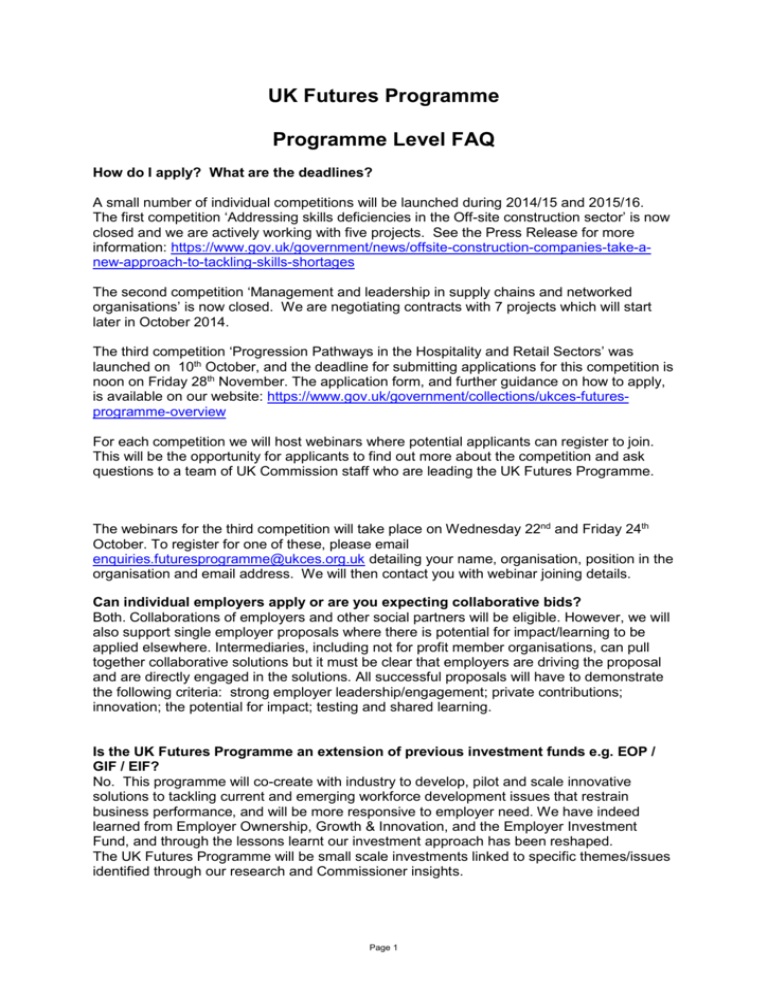
UK Futures Programme Programme Level FAQ How do I apply? What are the deadlines? A small number of individual competitions will be launched during 2014/15 and 2015/16. The first competition ‘Addressing skills deficiencies in the Off-site construction sector’ is now closed and we are actively working with five projects. See the Press Release for more information: https://www.gov.uk/government/news/offsite-construction-companies-take-anew-approach-to-tackling-skills-shortages The second competition ‘Management and leadership in supply chains and networked organisations’ is now closed. We are negotiating contracts with 7 projects which will start later in October 2014. The third competition ‘Progression Pathways in the Hospitality and Retail Sectors’ was launched on 10th October, and the deadline for submitting applications for this competition is noon on Friday 28th November. The application form, and further guidance on how to apply, is available on our website: https://www.gov.uk/government/collections/ukces-futuresprogramme-overview For each competition we will host webinars where potential applicants can register to join. This will be the opportunity for applicants to find out more about the competition and ask questions to a team of UK Commission staff who are leading the UK Futures Programme. The webinars for the third competition will take place on Wednesday 22nd and Friday 24th October. To register for one of these, please email enquiries.futuresprogramme@ukces.org.uk detailing your name, organisation, position in the organisation and email address. We will then contact you with webinar joining details. Can individual employers apply or are you expecting collaborative bids? Both. Collaborations of employers and other social partners will be eligible. However, we will also support single employer proposals where there is potential for impact/learning to be applied elsewhere. Intermediaries, including not for profit member organisations, can pull together collaborative solutions but it must be clear that employers are driving the proposal and are directly engaged in the solutions. All successful proposals will have to demonstrate the following criteria: strong employer leadership/engagement; private contributions; innovation; the potential for impact; testing and shared learning. Is the UK Futures Programme an extension of previous investment funds e.g. EOP / GIF / EIF? No. This programme will co-create with industry to develop, pilot and scale innovative solutions to tackling current and emerging workforce development issues that restrain business performance, and will be more responsive to employer need. We have indeed learned from Employer Ownership, Growth & Innovation, and the Employer Investment Fund, and through the lessons learnt our investment approach has been reshaped. The UK Futures Programme will be small scale investments linked to specific themes/issues identified through our research and Commissioner insights. Page 1 The Department for Business, Innovation and Skills is running a further Employer Ownership fund, targeting skills development in the automotive supply chain. UKCES is not managing this fund and it is entirely separate from the UK Futures Programme. Further information on the new Employer Ownership fund can be found here: https://www.gov.uk/government/publications/employer-ownership-developing-womenengineers and https://www.gov.uk/government/publications/employer-ownership-improvingengineering-careers Why have you moved to small scale investments as opposed to the larger sums available through previous investment rounds? We have achieved a tremendous amount with larger investment rounds we have conducted, but this new programme allows us to be more targeted in our approach and more impactful, as we deliver truly ground-breaking means of testing and trialling what works in addressing those long term workforce development issues that hold back UK growth. The UK Futures Programme is a research and development approach to skills and enables us to work directly with employers to develop and pilot innovative solutions to identified challenges and learn what works and what doesn’t work. My GIF/EIF project is really successful. Can I bid for extra money to make it sustainable? The purpose of the UK Futures Programme is to test and trial new ideas. We want to find out what works and what doesn’t work. There may be the opportunity for you to apply for the programme where your current project fits the specific competition brief and your project delivers one of the project stages (e.g. it may be that your project is scaling – adapting a successful idea to a new sector or geography). What are the project types? The project types are research, developing, piloting and scaling. ‘Each Competition brief will identify which types of project are invited. Are projects expected to cover all types of research, development, piloting, scaling? We do not expect to see projects that aim to cover all four types. The expectation is that we will get a range of projects of different types. For example, some applications will be purely focused on research; others developing a product/solution; others about testing an existing product/solution; others about taking something that is already operating on a limited scale and “scaling up”. The indicative level of UKCES investment is determined by the stage the project is at. Further information can be found in the guidance document: https://www.gov.uk/government/publications/ukces-futures-programme-guidance-documenttypes-of-project. What level of financial contribution can we expect? There is an expectation that employers will lead any applications submitted, and to financially contribute to the cost of the solution proposed – which sits at the heart of cocreation. In some cases, the UKCES financial contribution will be the minority contribution. The balance of public and private investment contributions will differ depending on whether your proposal is for a research, development, piloting or a scaling product/service. The individual Competition brief outlines the maximum amount of UKCES financial contribution for each project. Page 2 For the Hospitality and Retail competition, the UK Commission alongside the Department for Work and Pensions are prepared to invest up to £250,000 per successful proposal, with a total investment pot of up to £2million. Can the nature of contributions, within my proposal, come from both private and public sector bodies? Contributions from public sector bodies would not be seen as employer contributions. However, should you secure contributions from public sector bodies you would need to provide information on these contributions in the ‘other (non-UKCES) funding’ tab of the Financial Investment sheet (which forms part of the application form) rather than be included as an employer contribution. It would not be right if the ‘private’ contributions were solely from public sources. Employer leadership and direct employer contributions are essential. You say that you aim to be more responsive to employer need, and yet you are defining the areas and priorities you’re interested in. That’s a contradiction. Learning what works is very important to us. We recognise that if we want to do this, we need to concentrate our innovations in specific areas to enable us to share learning and to compare what works and what doesn’t. Our previous investment programme did not allow this to a great extent because of the variability in the purpose and execution of projects. We will select themes for our competition based on research and our Commissioner advice which will chime with employer need and will test these with employers and key stakeholders before launching competitions, but it is true that we will not be able to co-invest in all areas. What do you mean when you talk about “co-creation”? We want to offer on-going support to those projects in which we invest, that goes above and beyond monetary investment (for example, helping to transfer knowledge to other organisations and share best practice that emerges). This is a really important aspect of the UK Futures Programme The following are some of the ways we can help to ‘co-create’ projects: - - The leadership and expertise of our Commissioners who can support and direct the shape of projects and help find solutions to barriers Bring our experience of working with business to tackle skills problems to this Programme. We can anticipate many of the problems faced and how to resolve them. We have a wealth of Research and evidence to support individual projects through the Programme Our Innovation Labs will bring projects together to solve problems collectively What support can I expect from the UK Commission during the co-creation of any solution my industry proposes? Every project will have a dedicated Relationship Manager. Historically, the UKCES’ involvement in the investments was focussed primarily on financial co-investment and active contract management. We now want to play a much more substantial ‘co-creation’ role, where we offer on-going support to those projects in which we invest, that goes above and beyond monetary investment (for example, helping to transfer knowledge to other organisations and share best practice that emerges). We will develop shared learning platforms across projects and engage specialists and experts to help direct projects and, of course, our Commissioners and their networks and expertise will be at the heart of this programme. Page 3 What will the UK Commission expect from successful applicants? Successful applicants will have: strong employer leadership and engagement an appropriate balance of public and private contributions innovation testing and shared learning the potential for impact What is meant by ‘testing and shared learning’? Testing is crucial to the UK Futures Programme and so must be built in to the design of every project. Testing innovative ideas or prototypes with a cross-section of the market is critical to learning about what makes the biggest difference. We will support projects to implement testing methods where necessary. Successful applicants will also share their learning to inform wider practice by participating in quarterly Innovation Labs during the project lifetime. It is expected that projects will collect testing and learning data as a matter of course so will be ready to share with the group. Participation in the Innovation Labs will require preparation and readiness to input to the group, attendance and engagement in the group, cascading and action of any relevant learning, and providing feedback. Are there any other sources of UKCES investment that we can tap into? The UK Futures Programme is the only investment programme that the UK Commission is currently operating. There are no current plans to launch other investment programmes. The expectation is that the UKCES will contribute to projects that have substantial private investment to hand. We have a suite of documents that capture further information and guidance about the UK Futures Programme. They can be found on our website: https://www.gov.uk/government/collections/ukces-futures-programme-overview Will “in-kind” contributions be seen as a lesser contribution than “cash”? It’s all about getting the right balance for your project! UKCES will accept in-kind contributions, cash contributions and a combination of both. All private contributions should seek to add value beyond its monetary worth by applying resources to their best effect. There is no science in getting the balance right as long as it addresses the problem, has a sound rationale, is realistic and achievable and considers longer term sustainability. This is reliant upon a good understanding of what/how the solution can be achieved and gives due consideration to the nature, quality and the timing of the contributions. For both cash and in-kind contributions, it is important that the contribution is both quantifiable and well evidenced. It is also necessary that the contributions occur within the timespan of the competition we are funding. For further information, please see the guidance document on “public and private contributions”: https://www.gov.uk/government/publications/ukces-futures-programmeguidance-document-private-and-public-contributions Page 4
